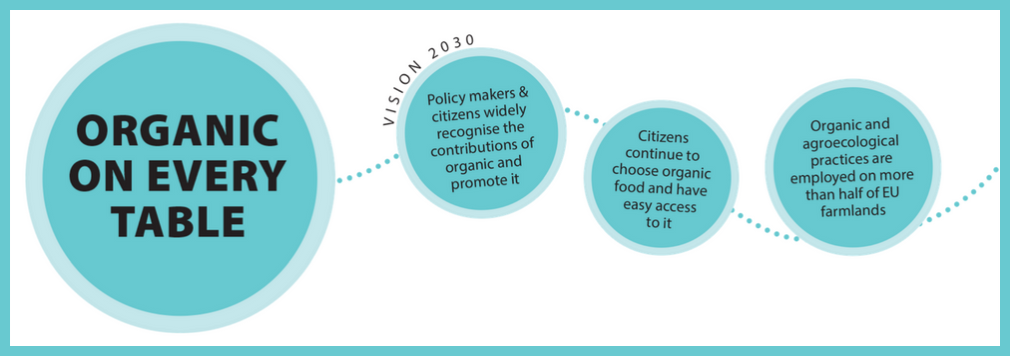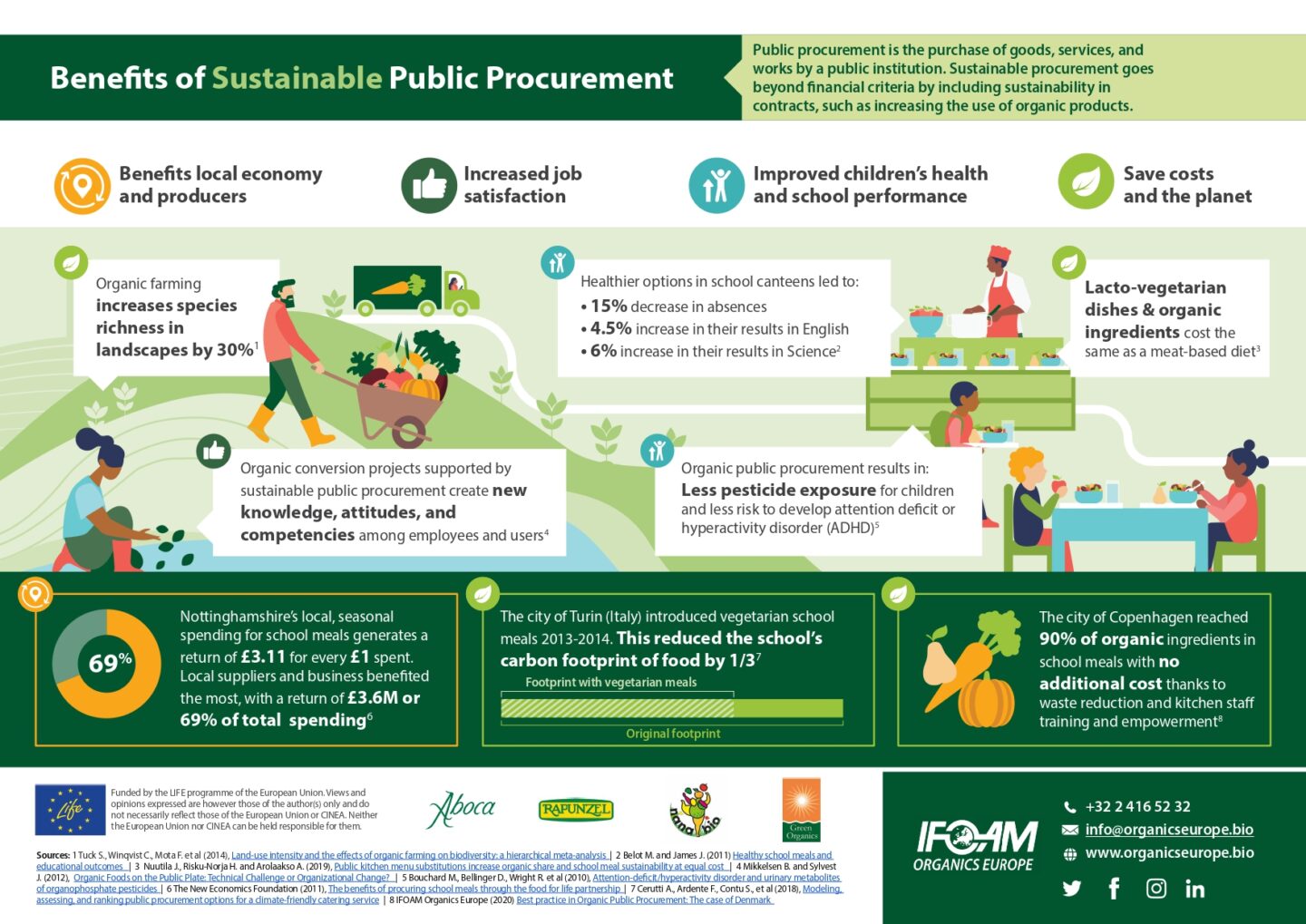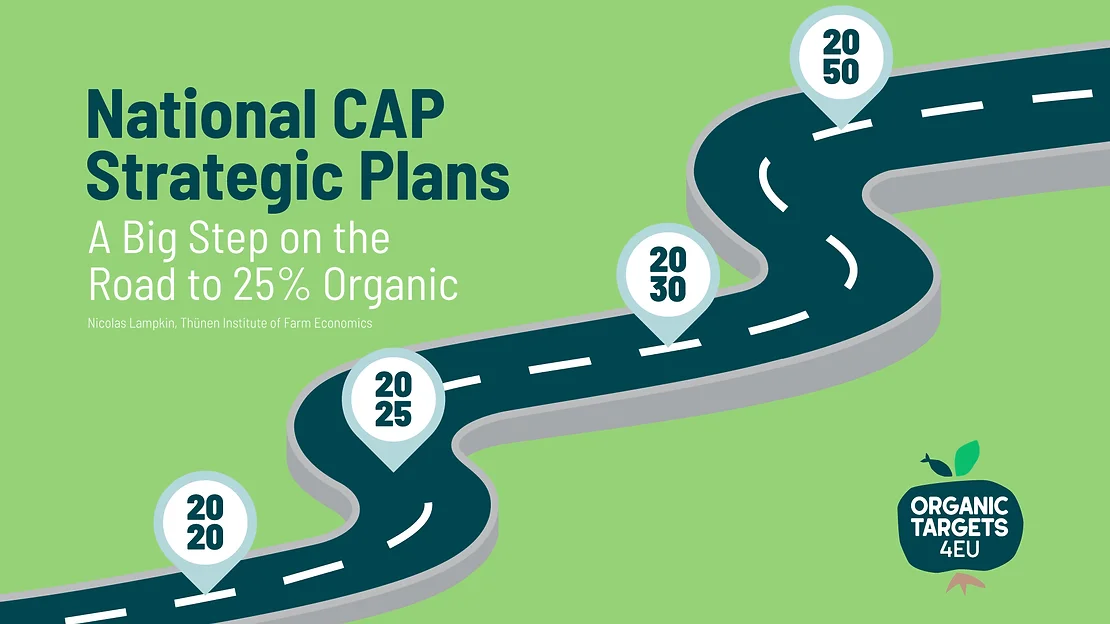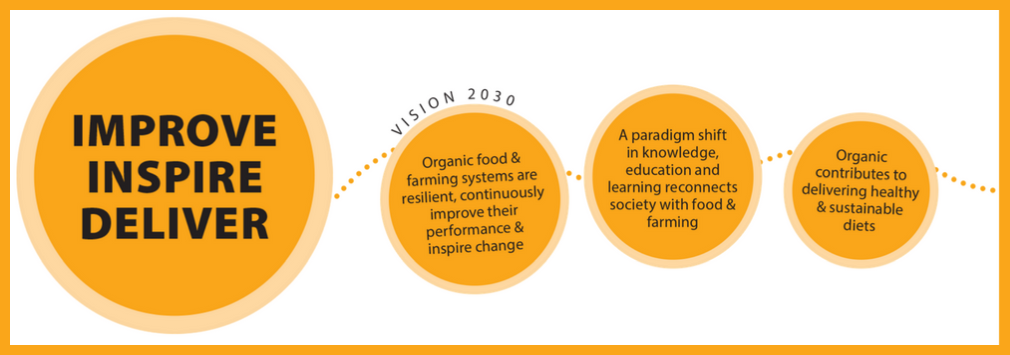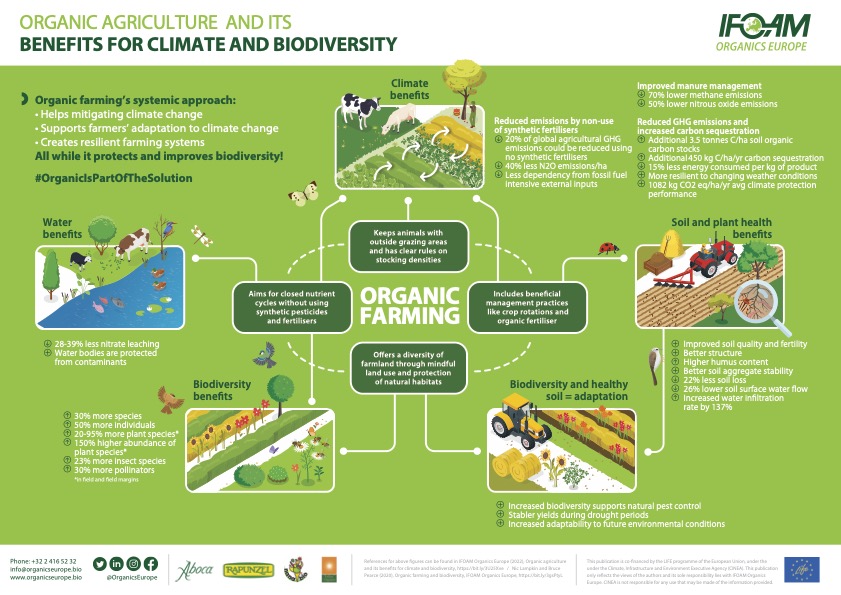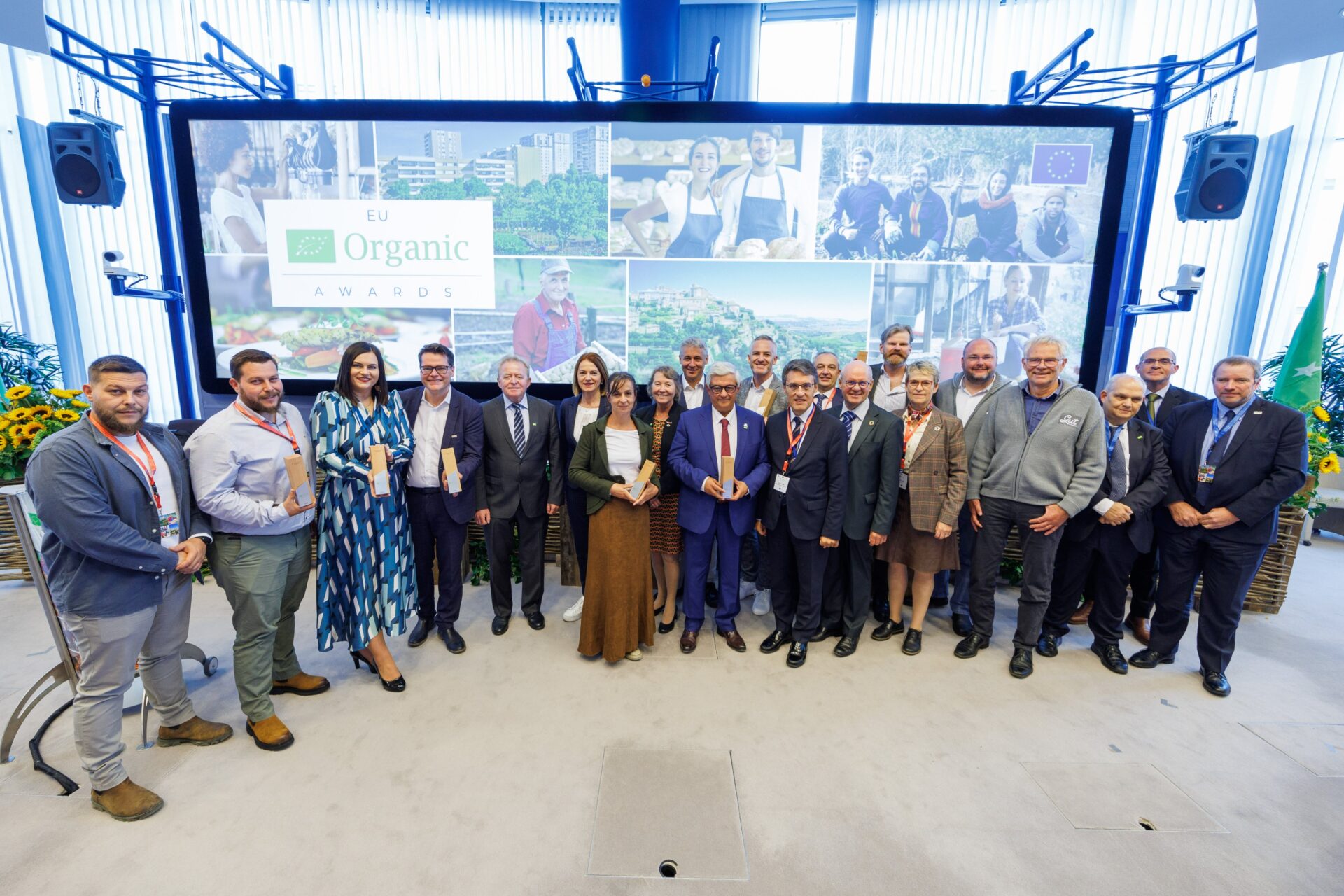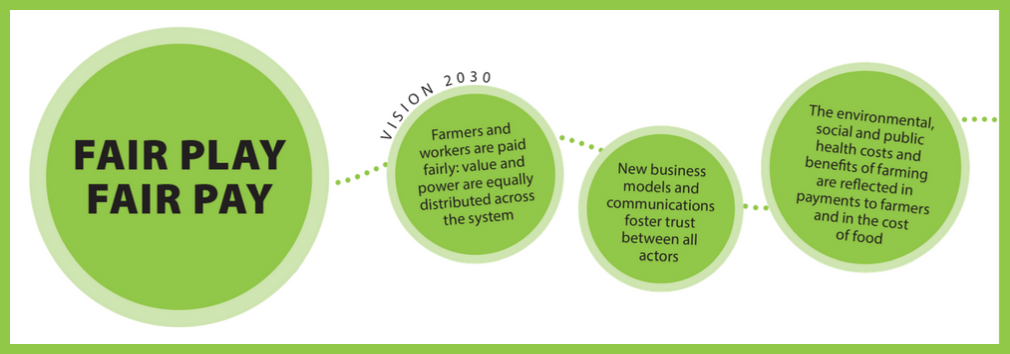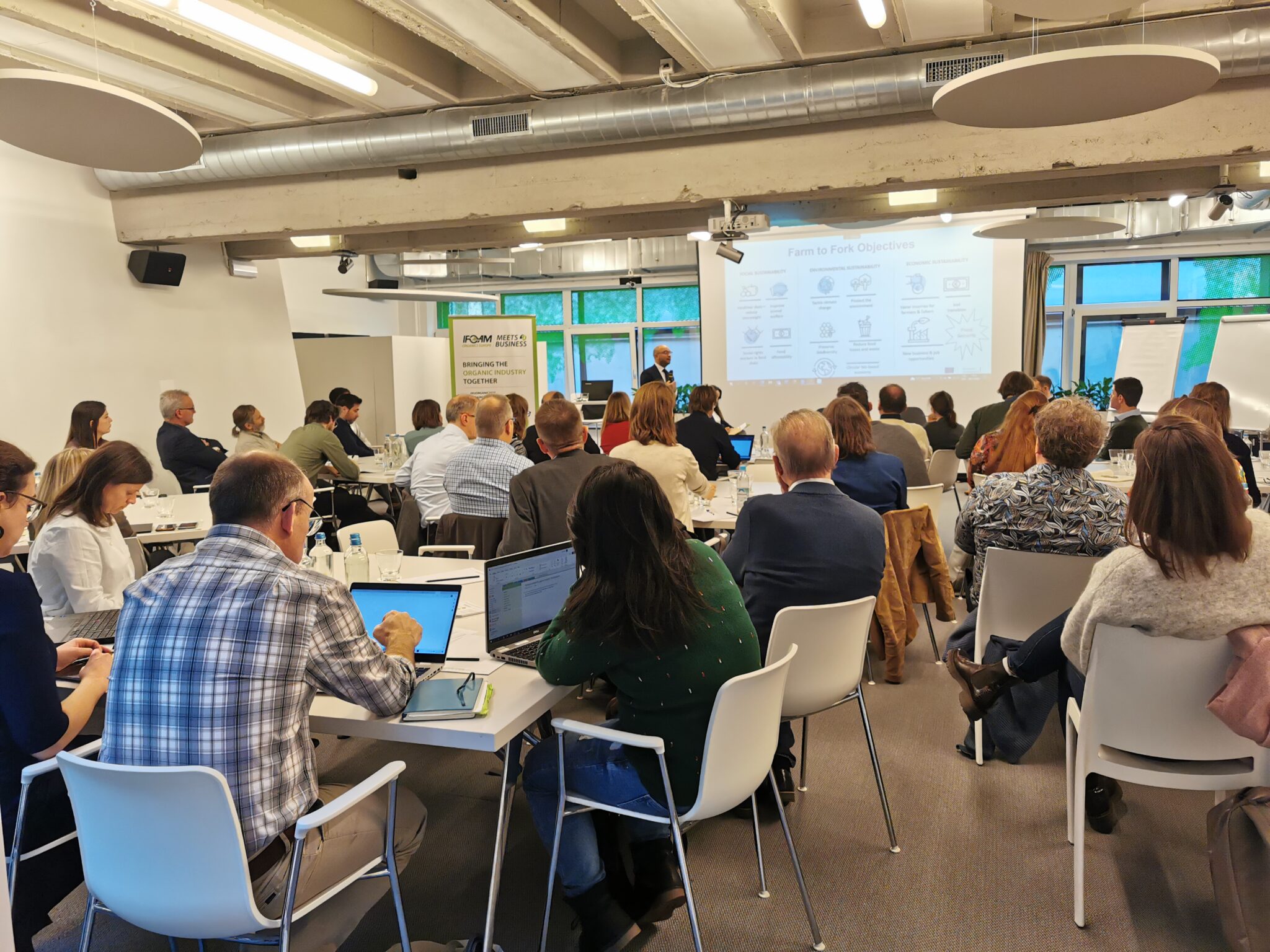Our achievements
Organic on every table
For us, Organic on every table means high-quality and healthy food becoming more widely available. This can only be achieved by increasing production and raising awareness among consumers and policymakers of organic’s economic, environmental, and social benefits.
To make organic on every table a reality, we advocated policymakers to put in place incentives and coherent policies supporting farmers providing public goods and promoting the consumption of organic food. We also aim to build sustainable and resilient value chains and to keep GMOs and synthetic pesticides out of organic production.
Countering false claims about plant health and natural pesticides
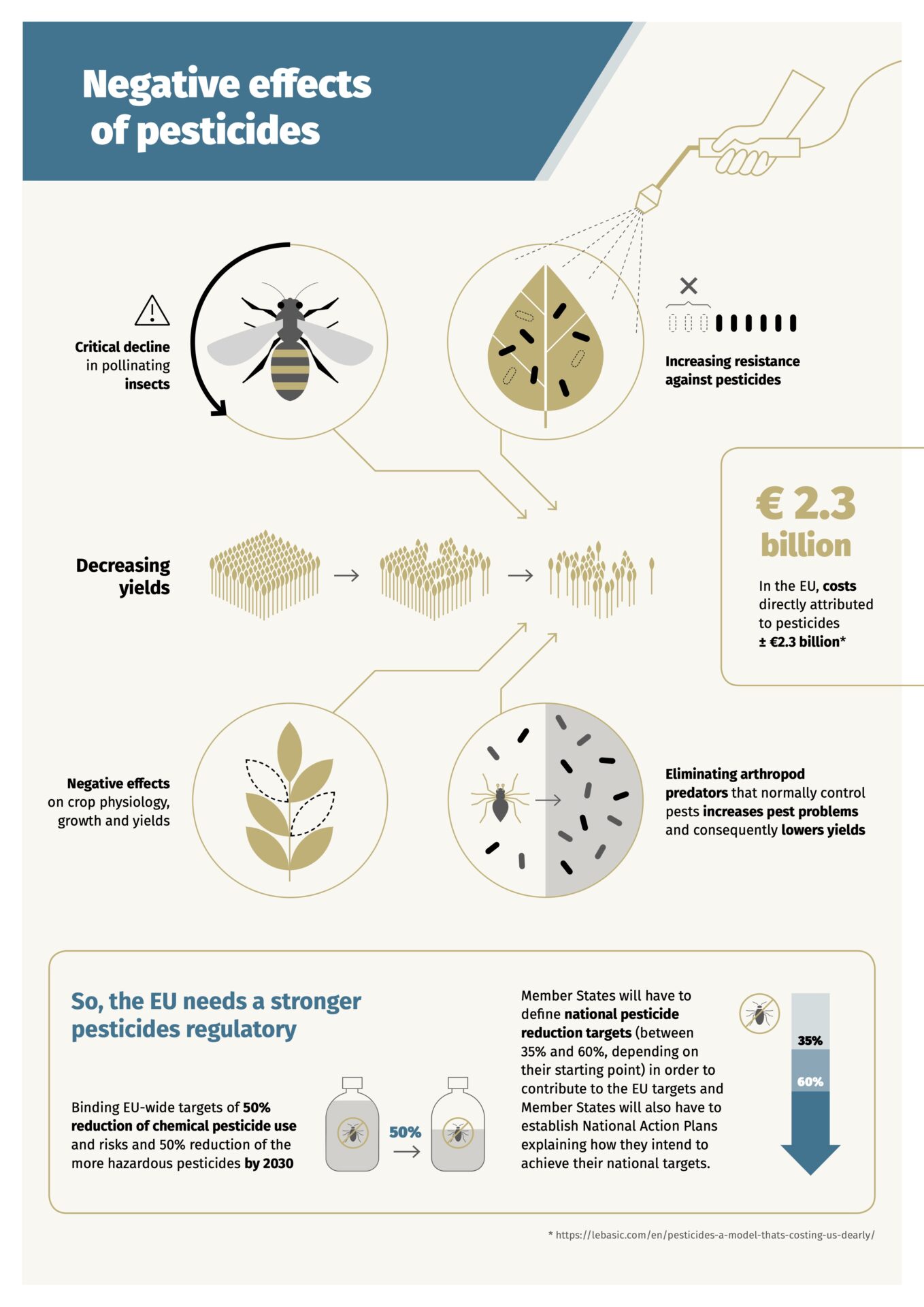
In 2023, as the European organic movement, we continued to advocate for a reduction in the use of pesticides as these are largely responsible for the disappearance of pollinators, other insects, and birds. We believe that embracing the organic principles can provide a path forward to create a pesticide-free agriculture system in Europe. The rejection of the Sustainable Use Regulation (SUR) (a regulation proposal aiming to curtail the use and risk of the more dangerous pesticides by 50% before 2030) only further highlighted organic farming’s importance as a strong pillar for more sustainable agriculture that does not rely on synthetic pesticides.
In 2023, we actively countered the arguments of the pesticide industry sustaining that natural pesticides are more harmful than synthetic pesticides since they are used in larger quantities. These same ideas underscore the proposal of indicators for measuring pesticide reduction that discriminates against natural substances, such as the Harmonised Risk Indicator 1 (HRI-1).
To underscore this point and to spread awareness of this issue, we commissioned an explainer video on the organic approach to plant health, in which we highlighted the shortcomings of the HRI-1 indicator to assess pesticide risk. On this topic, we also published a policy brief proposing an adjustment of the HRI-1 indicator to correct its misrepresentation of risk. This was presented in a press conference dealing with the HRI-1 indicator and the dangers related to its use.
As part of our efforts to find organic alternatives to synthetic pesticides, we also took part in IPMWorks, a project building a European farm network to promote the adoption of integrated pest management (IPM) strategies. These strategies are based on a diversity of pest management measures that are combined at the farm level to reduce reliance on pesticides. In February, IFOAM Organics Europe was present at the European Parliament for an exhibition of IPMWorks showcasing the project’s results to 40 MEPs from different political groups. Similarly, we co-hosted the “Way Forward in Organic Plant Health Care” conference in November 2023 aiming to bring together researchers, farmers, extension workers, policymakers, and authorities to discuss and develop plant health care strategies ever more in line with biodiversity and ecosystems as a whole.
Fighting to keep inputs GMO-free: New genomic techniques & seeds
In 2023, IFOAM Organics Europe continued its efforts to ensure that the legislative proposal on a new regulation of plants created through so-called New Genomic Techniques (NGTs) takes into account concerns of the organic movement, especially in regards to provisions on traceability, labelling, and the possibility for national co-existence measures. NGTs, such as transgenesis, TALENs, Zinc Finger Nuclease, or CRISPR/Cas9, involve the editing of an organism’s genes without having to introduce the DNA of a foreign plant, thus creating new genetically modified organisms (GMOs). Currently, there is not enough comprehensive scientific data and no long-term studies available to properly evaluate the risks they might present. According to the European Court of Justice’s ruling of 25 July 2018, these new techniques of genetic modification are GMOs and must be regulated as such. Therefore, it is crucial to maintain transparency, traceability, and risk assessment for products obtained through NGTs to avoid their unchecked diffusion through the supply chain. Without proper traceability, labelling, and transparency, consumers and producers may not be able to make informed choices and organic operators may not be able to ensure that their production is entirely GMO-free.
Another worrying implication of dismantling the GMO regulation is an exacerbation of the problem of patents and intellectual property rights, since both the processes and the products of GMOs and NGTs are currently patentable under EU law, regardless of the breeding method. This would virtually put an end to the free access to genetic material for plant breeders, which in turn would lead to reduced genetic diversity available to develop new crops and a reduced choice for farmers and consumers, as well as constant legal uncertainties regarding patent infringement claims. For these reasons, we are concerned by the legislative proposal published by the European Commission in July 2023.
Ahead of the publication of the legislative proposal, IFOAM Organics Europe undertook extensive advocacy efforts both on a technical and a political level in the European Commission, in several DGs, as well as the cabinets of Commissioners. On February 7, a petition which was run by the Biodynamic Federation Demeter International, and promoted by IFOAM Organics Europe, was presented to the European Commission with over 420.000 signatures, urging for the regulation and labelling of the new generation of genetically-modified organisms. On 16 May, alongside over 300 other organisations, we co-signed a letter addressed to Executive Vice-President for the European Green Deal Frans Timmermans, asking him to intervene and prevent the far-reaching deregulation of new genomic techniques at the expense of nature and climate, and of farmers’ and consumers’ rights. We also signed several more letters addressed to EU agriculture ministers, warning them about the implications of deregulating NGTs, and urging them to maintain traceability and labelling of all GMOs, including NGTs. After the publication of the proposal, IFOAM Organics Europe also contributed to the public consultation and submitted feedback to the European Commission on the Have Your Say website.
During our General Assembly on 22 June, as the European Organic movement, we adopted a resolution in favour of ensuring that organic production remains GMO-free. The resolution calls for a shift away from short-term fixes like genetic engineering towards holistic, agroecological approaches and reaffirms our commitment to the Farm to Fork and EU Green Deal Strategies. IFOAM Organics Europe also engaged extensively in advocacy work and member capacity-building during the co-decision process which started after the publication of the legislative proposal. We reached out with meeting requests and letters to parliamentarians as well as national delegations of the European Council to share our main concerns and demands on the NGT proposal. The IFOAM Organics Europe membership was continuously updated on important policy developments and key strategies, argumentations, and material were shared to streamline and galvanize national advocacy actions as well.
In order to highlight once more our commitment to keeping NGTs out of organic and calling for traceability and the possibility of national co-existence measures, IFOAM Organics Europe organised a press conference on 30 November, which saw the participation of Angelika Hilbeck, a Senior Scientist at the Swiss Federal Institute of Technology as well as Jan Plagge and Bernard Lignon, IFOAM Organics Europe president and board member respectively. During the press conference, Dr. Hilbeck explained that NGT technology is unsafe because it focuses on editing single genes while disregarding the contextual system in which genes are embedded and which defines their phenotypic expression.
This distinction between adjusting single genes or traits of a plant and adopting a system-based approach is also at the centre of our briefing paper on sustainability in organic breeding. The paper refutes the idea that sustainability can be based on a single plan variety or gene since properties are based on the interaction of many genes, and are impacted by environmental and geophysical factors, including soil health, and relationships with other species. The briefing document further highlights the significant achievements of organic breeding programs, which are often socially innovative as well. The paper also underscores how NGTs tend to legitimise patents on plants contributing to the monopolisation and corporate control of genetic resources at the expense of farmers and SMEs. We further illustrated this point in our infographic on the dangers of pairing GMOs and patents on seeds – a combination that could lead to lower innovation and less genetic diversity. As the European Organics movement, we will continue to advocate for keeping GMOs, including new GMOs derived from NGTs, strictly regulated and for a holistic approach that considers all the complexities of our agro-ecosystem, rather than one based on technological quick-fixes and editing single traits. To raise awareness about this issue we have also created a video explaining what are NGTs and why we need to keep them regulated. Furthermore, in addition to communicating about this to the wider public and policymakers, we were involved in strong capacity-building efforts and outreach to our members through regular updates via mail, a “living article” on GMOs on our website, and two “Let’s discuss organic” sessions where we update our members on important developments in organics.
Increasing demand for organic by promoting public procurement
In 2023, IFOAM Organic Europe continued to proactively advocate for sustainable public procurement during meetings with policymakers and stakeholders and at events, with a focus on the legislative framework for Sustainable Food Systems (SFS), one of the flagship initiatives of the F2F Strategy. We believe that public procurement serves as a catalyst for food system transformation and that it can lead to healthier and more sustainable food being consumed in Europe. IFOAM Organics Europe is part of the Food Policy Coalition (FPC), a coalition of civil society organizations aiming at policy integration and alignment at the EU level to facilitate the transition to sustainable food systems – IFOAM Organics Europe co-leads the FPC Task Force on public procurement, together with ICLEI – Local Governments for Sustainability. Furthermore, we are also part of the European project SchoolFood4Change, which aims to shift school meals and schools into a new paradigm by addressing public health, and social and environmental resilience. In this project, cities and schools get the tools to serve healthier meals, cook more sustainably, and procure more organic, local, and seasonal food.
On March 22-23, at the ‘Small Farm to Fork Procurement’ conference in Brussels, IFOAM Organics Europe co-hosted a session on sustainable school meals for the SchoolFood4Change project. During the conference, policymakers, food procurers, experts, and NGOs discussed best practices, mandatory procurement criteria, and the Sustainable Food Systems Law. Moreover, the event started with the handover of the Sustainable Food Procurement Manifesto to MEP Karin Karlsbro. This manifesto, to which realisation we collaborated, aims to inspire the European Commission and the EU Member States, as well as regional and local public authorities, with seven actionable propositions for establishing minimum standards for public canteens in Europe. We also translated the manifesto into five languages and actively disseminated it – finding 13 local government endorsers. On 25 April, IFOAM Organics Europe and all other members of the FPC launched the report “Sustainable Food Systems Law: policy recommendations for a meaningful transition”. The report urged the need for a new SFS legal framework that looks at the whole food system from production to processing, distribution, and consumption. In addition, it presented a list of priorities that are essential building blocks to enable the transformation of our food systems. On 10 October, we co-organised the event “Promoting Social Innovation through public canteens” attended by local and national government representatives, as well as European policymakers, during which the SFP manifesto was handed out to Members of the European Parliament. The event also featured a presentation of the petition A healthy school meal for every child in every school signed by more than 50,000 Europeans and started by the Buy Better Food campaign – a coalition of which IFOAM Organics Europe is a member advocating for better food procurement in Europe.
IFOAM Organics Europe expressed regret that the European Commission decided to delay the publication of the sustainable food systems law until a future non-defined date. In order to push the Commission to still publish this law, IFOAM Organics Europe signed several joint letters, the most impactful of which was sent to Commission President von der Leyen herself and signed by nearly 300 NGOs and scientists. In October, we co-signed another open letter to President Von der Leyen on the SFS and the Strategic Dialogue on the Future of agriculture together with 25 scientists, academics, and NGOs. The letter reminded the Commission that the Strategic Dialogue on the Future of Agriculture should stay on course to transition to sustainable food systems – adapting to and mitigating climate change and biodiversity loss.
Building a thriving organic market by monitoring the implementation of the CAP, Organic Regulation, and EU Promotion Policies
In 2023 we continued to closely monitor the implementation of the Common Agricultural Policy (CAP) 2023-2027. IFOAM Organics Europe is committed to ensuring that the national CAP Strategic Plans unveiled in 2022 are as ambitious as possible for the development of organic agriculture. Securing sufficient support for organic in these strategic plans is essential to reach the targets laid out by the EU F2F and Biodiversity Strategies of at least 25% organic farmland and a significant increase of organic aquaculture by 2030. In order to ensure that these targets will be achieved, IFOAM Organics Europe has been leading the Horizon Europe project “OrganicTargets4EU”. This project works on outcomes that will drive the growth and development of the organic sector focusing on policy implementation, evidence-based decision-making, increased and coordinated Research & Innovation, and increased knowledge sharing. Within this project, all national CAP Strategic Plans were analysed and a report was published in April providing an assessment. The analysis shows that, compared to figures from 2018, Member States aim to almost double the area supported by 2027, and they set targets for organic land, either in their CAP Strategic Plans or in their national organic action plans. Furthermore, in 2023 IFOAM Organics Europe and its interest group of organic farmers started discussing the next step for the new CAP taking place after 2027. To involve different stakeholders in the technical topics currently discussed for the next CAP, the Commission launched a series of technical workshops and it specifically requested the presence of Organics Europe’s farmer representatives. Within IFOAM Organics Europe, we are discussing the CAP with our Interest Group of Organic Farmers (IGOF) to make sure organic farmers’ voice is heard at the EU level.
Alongside the CAP, in 2023 we closely monitored the implementation of the EU Organic regulation. As part of this, we focused particularly on the handling of pesticide residues. Organic operators face significant administrative and economic burdens caused by unavoidable pesticide contamination. IFOAM Organics Europe is looking for a way for organic operators to avoid being unfairly penalized by pesticide residues. In this regard, In May we published a position paper detailing how organic production is performed in a contaminated world with the omnipresence of pesticides. The paper was the final outcome of our Pesticide Use & Contamination project, the main objective of which was to agree on a common approach of the organic sector on how to deal with pesticide residue findings. The project also delivered a scientific article published in the scientific journal Environmental Pollution, a policy brief, two reports, and a pilot study. The study found that due to the variability in pesticide contamination influenced by factors such as substances, agricultural practices, and environmental conditions, uncertainties persist regarding pesticide contamination and its risks for the organic food chain. On this topic, we also organised a webinar with IFOAM International in November.
Another significant development we followed in 2023 was the budget allocated for promoting organic products under the EU Promotion Policies. Specifically, the European Commission earmarked a big share of the 2023 EU promotion budget for sustainable agriculture and about 40 million EUR were explicitly targeted toward promoting organic production and products. We had the opportunity to discuss the EU promotion policies with our members during one of our ‘Let’s Discuss Organic’ sessions. This webinar provided guidance and concrete tips on submitting successful applications and representatives from the European Commission attended it. The EU promotion policies provide a great opportunity to promote organic products in Europe and abroad.
Improve – Inspire – Deliver
The roadmap’s second pillar to achieve our vision for 2030 is Improve – Inspire – deliver and it aims to make the organic sector more competitive and resilient. IFOAM Organic Europe is committed to demonstrating the solutions organic food and farming can provide to the challenges facing our food systems and advocate for key issues at the intersection of environmental and agricultural policies.
In line with our dedication to delivering added value to our stakeholders and ensuring they stay abreast of the most important information concerning the organic sector, we proudly launched our first special edition newsletter in 2023. Within this newsletter, we offer insights into the latest policy developments in agri-food, and we underscore the actions IFOAM Organics Europe has taken to support organic food and farming at the EU level.
Positioning organic as part of the solution to climate, soil & biodiversity crises
In 2023, we continued to highlight organic’s positive contribution to protecting our soil, water, and biodiversity, and simultaneously making our farming systems more resilient to the effects of climate change. We are committed to making sure that organic’s benefits for climate and biodiversity are recognized by policymakers and the wider public in the EU, and that organic farming is seen as one of the best solutions to curtailing agricultural emissions. It is fundamental for us to demonstrate that organic practices deliver more resilient systems with many benefits to soil health, water quality, biodiversity protection, reduction of GHG emissions and increased carbon sequestration and climate adaptation.
In 2023, the European Union introduced a series of legislative measures aimed at environmental protection and climate change mitigation. IFOAM Organics Europe played a pivotal role in advocating for these initiatives. One such legislation we closely monitored was the Carbon Removal Certification Framework (CRCF), proposing a voluntary EU-wide framework to certify carbon removals and carbon farming activities. While IFOAM Organics Europe clearly recognizes the need to increase carbon sequestration, the legislation is not always in line with the organic approach. A too-narrow focus on carbon might have potential adverse effects on biodiversity, animal welfare, soil, and water quality and additionality requirements penalize first movers, such as organic farmers, who have already invested in soil health and carbon sequestration in the past through beneficial management practices. Additionally, we kept a close eye on the Nature Restoration Law and the Soil Monitoring Legislation. IFOAM Organics Europe clearly supported the heavily contested Nature Restoration Law, since an intact nature is the very basis of food production and it resonates with IFOAM Organics Europe’s mission of promoting agricultural practices that preserve nature and uphold biodiversity, soil health, and water conservation.
We proactively engaged by publishing press releasesand sending letters to members of the ENVI Committee and the European Parliament, urging their support. In these communications, we highlighted that organic farming proves that nature restoration can go hand in hand with productive farming systems and we underscored the law’s potential in safeguarding biodiversity, enhancing soil quality, combating climate change, and fostering sustainable farming methods and its importance to ensure food security in the long run. We also advocated in favour of the Soil Monitoring and Resilience Law as healthy soils are the cornerstone of organic farming and the proposal’s soil management principles closely align with those of organic farming. However, the legislation did not live up to the expectations of a Soil Health Law with binding targets to achieve healthy soils but rather focusses on setting up a soil monitoring system across the EU. With respect to the Soil Monitoring Law, we produced a leaflet highlighting the benefits of organic farming for soil health where we emphasised the importance of healthy soil and organic’s potential as a sustainable soil management practice. Furthermore, in our feedback to the consultation on the legislation, we called for the recognition of organic farming practices’ efficacy in soil management and for the establishment of legally binding targets to ensure the directive’s objectives are met. We also highlighted the omission of synthetic pesticides and fertilizers from the proposal, despite their significant impact on soil health, advocating for their explicit inclusion and regulation.
In 2023, IFOAM Organics Europe was active in addressing the negative impacts of agriculture on the environment by collaborating with various stakeholders in different projects and initiatives. IFOAM Organics Europe participated in the projects Climate Farm Demo and ClienFarms, which are testing and demonstrating practical solutions for climate-neutral farms and climate-smart farming practices. In addition, we continued to work together with our members in the Task Force on Climate Change and Biodiversity to keep members informed about the EU policy developments on climate and biodiversity, as well as to bundle expertise to provide guidance to IFOAM Organics Europe on the direction for further action. We also assisted our members by collecting messages, arguments, and visuals on organic and biodiversity for them to use in their advocacy and communication efforts and we discussed EU climate legislation in one of our “Let’s Discuss Organics” sessions. Furthermore, to increase awareness of the positive environmental impact of organic we created an infographic illustrating the organic benefits for climate, soil, water, and biodiversity. This infographic was also reshared by the social media account of the UN Secretariat of the Convention on Biological Diversity.
Innovating farming beyond just technology
Organic farmers, processors, companies, and civil society groups are eager to work with researchers to help organic deliver on its principles and transform Europe’s food and farming system. Farmers and other operators in the organic sector need access to sound knowledge enabling them to continue improving their practices. IFOAM Organics Europe represents and engages all these actors within the projects in which it takes part. Our mission involves bridging the gap between research and practice by delivering the latest research findings to practitioners and ensuring that research aligns with their needs and expectations. Additionally, we play a pivotal role in boosting innovation within the organic sector and possess extensive experience in facilitating dialogues among science, practice, and policy.
In 2023, we participated in several projects aimed at promoting the exchange of knowledge, best practices, and innovations in agriculture and organic farming. These initiatives focused on establishing platforms, networks, and methodologies to facilitate collaboration, learning, and the adoption of innovative techniques among agricultural practitioners. By fostering organic innovation, we contribute significantly to the sustainability and competitiveness of the organic sector.
Here are the most notable highlights and achievements from our R&I projects in 2023:
- As part of the ECO—Ready project an open call was launched selecting 10 Living Labs from different geographical zones. Additionally, IFOAM has been involved in the co-creation of the scenario development methodology, and in the promotion of the first round of a Delphi study to identify local challenges and interests around food security, biodiversity, and climate change.
- For the IntercropVALUES project, we facilitated the process of defining the topics of 4 policy briefs and 32 practice abstracts.
- As part of the EUFarmBook project, we helped develop a platform for practice-oriented information on all topics related to agriculture and forestry
- The FoodSHIFT project ended in December 2023 after producing the successful establishment of 9 FoodSHIFT Accelerator Labs (FALs), each one of which in turn gave birth to several FoodSHIFT Enabler Labs. In addition, the project delivered a transition toolkit for food system actors and a policy brief, entitled “Long-term Living Lab Support towards Food System Transformation.
- Within the IPMworks IFOAM organised and hosted 2 webinars on topics related to integrated pest management in organic farming,
For a more detailed overview of our project consult the “Projects we organised” chapter within this publication.
Rewarding excellence in the organic value chain
In 2023 we co-organised the second edition of the European Organic Awards together with the European Commission, the European Economic and Social Committee, the European Committee of the Regions, and COPA-COGECA. The annual European Organic Awards reward the most excellent and innovative actors in the organic value chain and aim to stimulate organic production by sharing the inspiring stories of people who achieved excellence in this field. We are hopeful that these awards will encourage many practitioners to transition to organic farming and become part of the solution to the many crises we face, including food security, biodiversity loss, and climate change.
In 2023 the awards were given to 8 winners in 8 different categories at a ceremony on 25 September:
- Best organic farmer (female): Clara Benito Pacheco (Entrelobas) – Serrada de la Fuente, Spain
- Best organic farmer (male): Thomas Moschos (Moschos Farm) – Kastoria, Greece
- Best organic region: Burgenland, Austria
- Best organic city: Stadt Wien, Austria
- Best organic “bio-district”: Idanha-a-Nova, Beira Baixa, Portugal
- Best organic food processing SME: The Merry Mill – Vicarstown, County Laois, Ireland
- Best organic food retailer: Gut Wulksfelde– Tangstedt, Hamburg, Germany
- Best organic restaurant/food service: Luftburg – Kolariks Freizeitbetriebe GmbH – Vienna, Austria
Advancing organic research with TP Organics
TP Organics, the European Technology Platform for Research & Innovation into Organics and Agroecology hosted by IFOAM Organics Europe, is advocating for public R&I funding benefiting the organic sector and leveraging its potential to lead the transformation of the wider agri-food system in Europe and beyond. In 2023, the second Work Programme of Horizon Europe, the EU´s main funding programme for research & innovation was published with 7 calls for projects specifically addressing organic research needs such as improving yields in organic cropping systems, organic advisory networks, increased availability and use of non-contentious inputs in organic farming, and a selective breeding programme for organic aquaculture. The sharing of knowledge ready for practice, which is crucial for the uptake and maintenance of organic farming, will be addressed as well by future research (and should build on already existing initiatives such as Organic Farm Knowledge). In addition, 23 further calls in the current Work Programme mention “organic” and a new European R&I Partnership, to be launched officially in early 2024, will build on the scientific evidence base and concrete practices of organic farming. The partnership called “AGROECOLOGY” will put farmers in the centre, with living labs and research infrastructures as the main instruments to unlock and accelerate the broad transition to agroecological farming in Europe. TP Organics has contributed to the development of the partnership and is part of AGROECOLOGY and the Work Package on science-policy dialogue, with IFOAM Organics Europe as an official partner, making sure that the organic sector plays a strong role and that results are taken up by policy and practice, while also building the capacity of the TP Organics and IFOAM Organics Europe members to apply for calls.
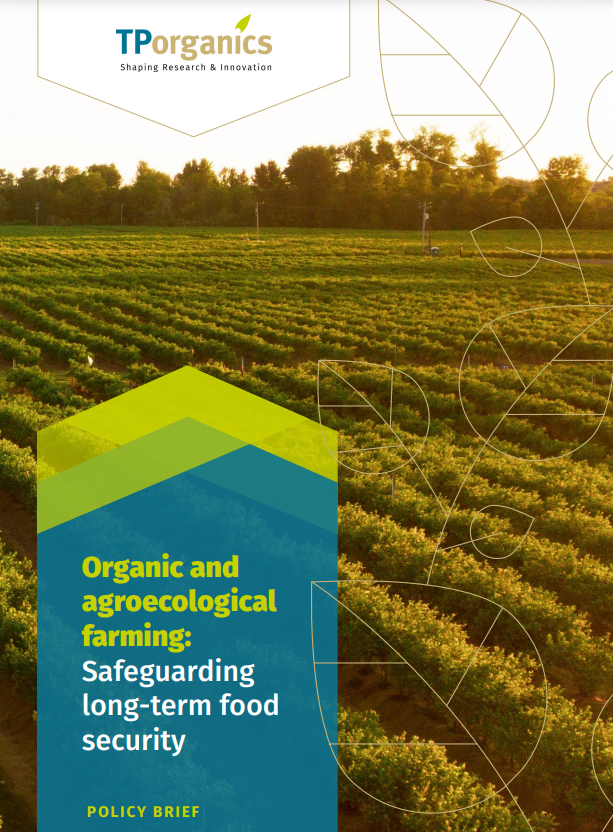
Besides the new European R&I partnerships, Horizon Europe also includes a new instrument called EU Missions. TP Organics is supporting the Mission “A Soil Deal for Europe” through events (see this review) and providing input regarding research priorities (see this position paper).
In view of the last part of Horizon Europe, TP Organics has published a new position paper with priority calls that should be included in the final Work Programme, based on its Strategic Research & Innovation Agenda for Organics and Agroecology.
The Organic Innovation Days 2023, TP Organics annual flagship event and the only EU event on organic and agroecological research and innovation, brought together a large audience of both organic stakeholders and EU policymakers to discuss R&I for long-term food security and beyond, linking to the policy brief published by TP Organics on 5 September 2023. Under the title “Citizen-driven transformation of European food systems”, the second day of the event hosted the final policy conference of FoodSHIFT 2030, a Horizon 2020 project focused on transforming the European food system towards a low-carbon, circular future, including a shift to less meat and more plant-based diets.
Fair play – Fair pay
The roadmap’s third pillar to achieve our vision for 2030 is ‘Fair play – Fair pay’. 2023 witnessed various challenges for the organic sector in Europe. Most notably, high inflation in the wake of Russia’s invasion of Ukraine created difficulties for both consumers and producers. As IFOAM organics we are committed to ensuring a resilient organic supply chain that works for the benefit of everyone. To guarantee sufficient availability of organic food for European citizens we need to ensure that organic farmers are adequately remunerated for their hard work and that organic retailers are incentivized to preserve their ethical and fair business model – a model that values consumers’ health and environmental sustainability. IFOAM Organic Europe believes that those who contribute the most to making our food system more sustainable should be recognised and rewarded for their efforts.
Avoid greenwashing and ensure labels don’t deceive
IFOAM Organics Europe was deeply involved in the advocacy work surrounding the Green Claims Directive – a proposal published by the European Commission in March 2023. While the proposal was initially meant to be called “Proposal for a Directive on Green Claims Based on the Product Environmental Footprint (PEF)”, IFOAM Organics Europe’s work contributed to ensuring that the directive would allow for green claims to be substantiated by other methodologies than the PEF. Indeed, while the PEF works well for manufactured products, it is ill-suited to assess the environmental impact of agri-food products, including textiles. The PEF can differentiate the environmental impact between product categories but does a poor job of distinguishing the environmental impact within product categories. This means that the PEF will show that an apple is more environmentally friendly than beef, but all types of beef would score equally poorly, even though some methods of beef production have fewer impacts on the environment than others. Another example is that all fruits and vegetables score A with the PEF, irrespective of the farming practice used, seasonality, greenhouse use, or transport time, or that eggs from caged hens come out as being more environmentally friendly compared to free-range or organic eggs.
During the remainder of 2023, we ensured that the Parliament would keep the same position as the Commission in terms of allowing for other methodologies than only the PEF. We distributed a briefing on PEF limitations widely both through media channels as well as to policymakers.
Notably, to raise awareness about the issue of green claims in the Parliament, we held an event on green claims and greenwashing in November 2023, organised by 3 Members of the European Parliament (MEPs) that had important roles in this file. Our position on the Green Claims Directive was also explained in a video interview with our Director Eduardo Cuoco occasion of the 2023 Natexpo trade show.
Furthermore, given the rise of the term “regenerative” and its (mis)use, IFOAM Organics Europe published a position paper on organic and regenerative agriculture stating that “The European organic movement believes that organic should continue to be at the core of regenerative agriculture and that “regenerative” certification and corporate branding using “regenerative” should be compatible with some key legislative requirements of the organic standard as minimum requirements upon which additional regenerative organic practices are built”. To provide more clarity on this issue, we created an easy-to-understand visual illustrating the differences between organic and regenerative and why the latter term can be deceiving.
In December we published a position paper on animal welfare practices and labelling in which we emphasise the importance of a European labelling scheme focused on elevating animal welfare standards. To achieve this, the organisation favours implementing mandatory method of production labelling for all animal species within the EU. The organic movement is concerned about the spread of such labelling schemes in several EU countries. IFOAM Organics Europe believes consumers must be informed about the environmental value of their food choices. However, this must be done in compliance with the European legislation on organic farming as regards the terms used, and on the basis of methodologies that take into account all the externalities linked to different modes of agricultural production, particularly on biodiversity.
Building bridges in the organic supply chain
The 2023 edition of IFOAM Organics Europe Meets Business was organised on 30 November 2023 in Brussels, Belgium. The event served as a valuable platform for exchanging ideas and fostering collaboration among various stakeholders in the organic supply chain.
The event focused on engaging discussions regarding current prominent topics and trends in the organic industry. Attendees included members of IFOAM Organics Europe, their respective members, and companies with an interest or involvement in organic products.
Participants joined for a day of enriching conversations, networking opportunities, and knowledge-sharing with well-esteemed speakers and industry experts.
